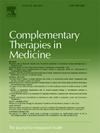The impact of neurolinguistic programming on anxiety, self-confidence, self-esteem, and performance in non-elite finswimmers
IF 3.5
3区 医学
Q1 INTEGRATIVE & COMPLEMENTARY MEDICINE
引用次数: 0
Abstract
Background
Few studies have addressed mental health in finswimmers.
Objective
This study examines the effect of NLP used as mental training on the finswimmers’ anxiety, self-confidence, self-esteem, and swimming records.
Methods
The NLP intervention lasted two months. The study involved thirty young finswimmers (mean age M = 15.53, SD = 1.024), divided equally into two groups: the experimental and the control group. We carried out a pre- and post-test research design and conducted a follow-up test. We used two questionnaires, the French version of the CSAI-2R and the French version of the PSPP, along with semi-structured interviews for all three tests.
Results
In the post-intervention test, the experimental group significantly decreased their cognitive anxiety (β = −3.47, p < .001) and somatic anxiety (β = −2.20, p = .001). Significantly increased their self-confidence (β = 2.07, p < .001), their global self-esteem (β = 1.93, p = .002), and their physical self-worth (β = 2.13, p = .004). The same parameters, except for the global self-esteem, also recorded significant change in the follow-up test, p < .005. Time effect did not show significance in the body attractiveness, physical strength, physical conditioning, and sport competence. Furthermore, outcomes showed notable between-subject variability in the mental skills, suggesting substantial variability in baseline parameter levels between individuals. Consequently, the finswimmers enhanced their swimming records.
Conclusions
NLP showed a powerful impact in optimizing finswimmers’ mental health and, accordingly, their athletic performance. Besides, the technique showed relatively durable effectiveness. Coaches can reinforce the effect through ongoing NLP training.
神经语言编程对非精英游泳运动员焦虑、自信、自尊和表现的影响
很少有研究涉及游泳者的心理健康。目的探讨NLP作为心理训练对游泳运动员焦虑、自信、自尊和游泳成绩的影响。方法NLP干预持续2个月。研究对象为30名年轻的游泳运动员(平均年龄M = 15.53, SD = 1.024),平均分为实验组和对照组。我们进行了测试前和测试后的研究设计,并进行了跟踪测试。我们使用了两份问卷,法语版的CSAI-2R和法语版的PSPP,以及所有三个测试的半结构化访谈。结果干预后测试中,实验组认知焦虑显著降低(β = - 3.47, p <; )。001)和躯体焦虑(β =−2.20,p = .001)。显著提高自信心(β = 2.07, p <; )。001),他们的整体自尊(β = 1.93, p = )。002),身体自我价值感(β = 2.13, p = .004)。相同的参数,除了整体自尊,在后续测试中也记录了显著的变化,p <; .005。时间效应在身体吸引力、体力、体能和运动能力上均不显著。此外,结果显示受试者之间的心理技能存在显著差异,表明个体之间的基线参数水平存在显著差异。因此,游泳运动员提高了他们的游泳记录。结论单核苷酸多态性对改善游泳运动员的心理健康和运动成绩有显著影响。此外,该技术显示出相对持久的有效性。教练可以通过持续的NLP训练来强化这种效果。
本文章由计算机程序翻译,如有差异,请以英文原文为准。
求助全文
约1分钟内获得全文
求助全文
来源期刊

Complementary therapies in medicine
医学-全科医学与补充医学
CiteScore
8.60
自引率
2.80%
发文量
101
审稿时长
112 days
期刊介绍:
Complementary Therapies in Medicine is an international, peer-reviewed journal that has considerable appeal to anyone who seeks objective and critical information on complementary therapies or who wishes to deepen their understanding of these approaches. It will be of particular interest to healthcare practitioners including family practitioners, complementary therapists, nurses, and physiotherapists; to academics including social scientists and CAM researchers; to healthcare managers; and to patients. Complementary Therapies in Medicine aims to publish valid, relevant and rigorous research and serious discussion articles with the main purpose of improving healthcare.
 求助内容:
求助内容: 应助结果提醒方式:
应助结果提醒方式:


